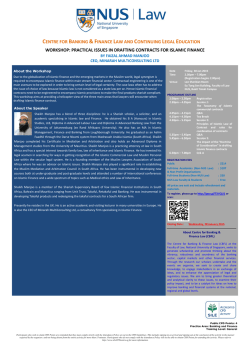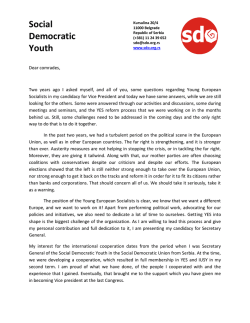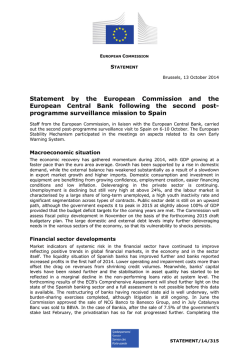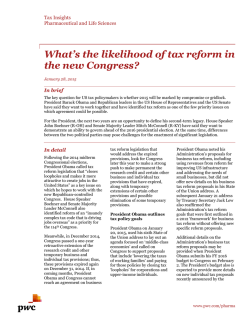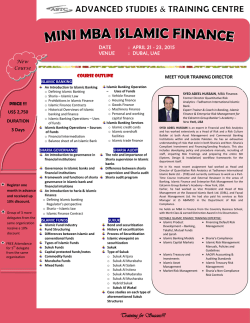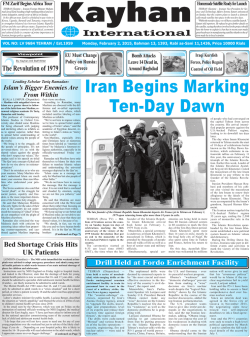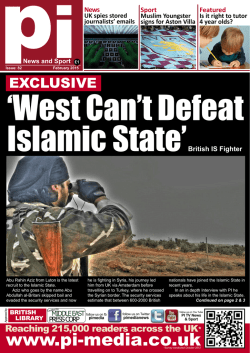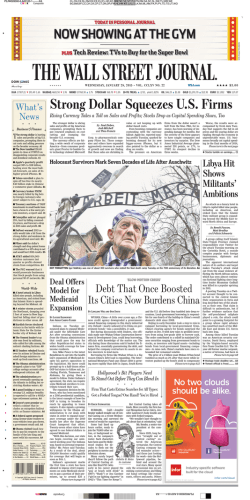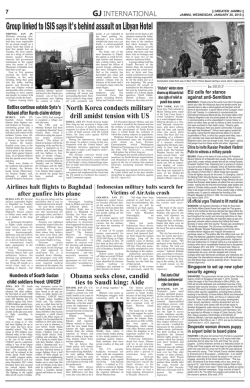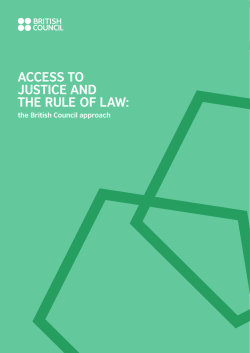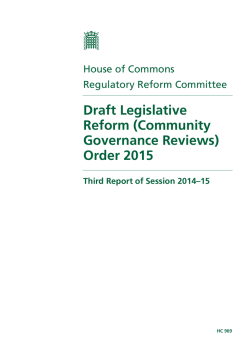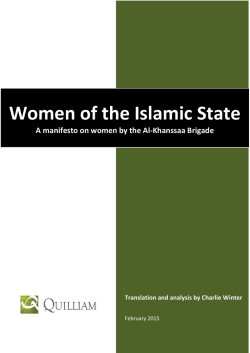
here - Islamic Reformulations
Reformers and Intellectual Reformulation in Contemporary Islam A Two-‐Day Symposium, 29-‐30 January 2015 Held at SOAS and QMU London A collaboration between: Study of Religions, SOAS, London School of History, Queen Mary University Institute of Arab and Islamic Studies, University of Exeter Sponsored by the Islamic Reformulations Project www.islamicreformulations.net Draft Programme (as of 23rd January 2015) Information on Conference Venues and how to reach them are available here Pre-‐conference Event Wednesday 28th January 2014 Evening, 6.00pm: Opening of Elaine M Goodwin’s Exhibition “Songs of the Desert”, Wolfson Gallery, SOAS Library, SOAS MAIN BUILDING. Day 1: Senate Room, Senate House Thursday 29th January 2014 0930 Opening Remarks: Conference Organisers 1000 Panel 1: The Reform of Muslim Philosophy and Spirituality Mohammed Drammeh (Qatar Faculty of Islamic Studies), “Ṭāhā ʿAbd al-‐Raḥmān and the Question of Philosophical Reform in Arab World” Susan Gunasti (Ohio Wesleyan University), “Philosophy as Methodology: Elmalılı Muhammed Hamdî Yazır’s Spiritualism and Religious Reform in the Late Ottoman Empire” 1100 Coffee/Tea 1130 Panel 2: Reforming Muslim Theology Katie Merriman (University of North Carolina at Chapel Hill), “Freedom By Our Own Hands: The Revolutionary Theology of Warith Deen Mohammed” Simon Wolfgang Fuchs (Princeton University), “Denigration, Deception, and Denial: Muhammad Ḥusayn Najafī Ḍhakkō and the Limits of Shīʿī Reform in Pakistan” 1230 Lunch 1330 Panel 3: Patterns of Reform in Islamic Law Junaid Quadri (University of Illinois at Chicago), “Muḥammad Bakhīt’s reformulation of the fiqh tradition in the face of modern science” Jawad Anwar Qureshi (University of Chicago), “Countering Reform: Saʿīd Ramaḍān al-‐Būṭī (1929-‐ 2013) and the Parameters of maṣlaḥa” [Short Break] David Warren (University of Manchester), “Yūsuf al-‐Qaradāwī and the Reform of the Islamic Legal (fiqh) Tradition” Salman Younas (University of Oxford), “A Conservative Jurist’s Approach to Reform: Ashraf ʿAlī al-‐ Thānawī on Women’s Political Leadership” 1540 Tea/coffee 1600 Panel 4: Reforming Muslim Hermeneutics Kamran Bashir (University of Victoria), “The Interpretive and Revivalist Potential of Jāved Aḥmad Ghāmidī’s Principles of Exegesis” Abdullah Sliti (Durham University), “Rational Authenticity: Ibn ʿĀshūr’s Potential Epistemological Reform of Tradition” 1700 Close Public Lecture: Brunei Lecture Theatre, SOAS). Thursday 29th January 2015, 7.00pm. Admission is free; no pre-‐registration required. 1900 Professor Muhammed Qasim Zaman (Princeton University) 'The Contested Terrain of Sufism: British India and Pakistan" Professor Qasim Zaman, Robert H. Niehaus '77 Professor of Near Eastern Studies and Religion at Princeton University, is a leading expert on modern Islamic intellectual movements, and the role of scholars in the theological, legal and political developments of contemporary Muslim thought. He has authored and edited a number of seminal studies on the topic, including The Ulama in Contemporary Islam: Custodians of Change (2002), Schooling Islam: The Culture and Politics of Modern Muslim Education (2007), Princeton Readings in Islamist Thought (2009) and Modern Islamic Thought in a Radical Age (2012). He was associate editor of the key text in the field, The Princeton Encyclopedia of Islamic Political Thought (2013). In this lecture he will address the question of how Sufism in colonial South Asia and in contemporary Pakistan has fared between its continuing appeal and the sharp attacks on it, and how issues relating to reform, governance, and violence have shaped its course. 2030 Close Day 2: Queen Mary University: morning sessions: Arts Two 3.20; afternoon sessions Francis Bancroft 1.13a Friday 30th January 2014 0930 Panel 5: Political Activism and Quietism in Muslim Reform Itzchak Weismann (Haifa University), “Saʿīd Hawwā of Syria: a Muslim Brother, Salafi, and Sufi” Samer El-‐Karanshawy (Qatar Faculty of Islamic Studies), “Muḥammad Mahdī Shams al-‐Dīn: Reform in Twelver Shī‛īsm as Antipathy to Political Islam” 1030 Coffee/Tea 1100 Panel 6: Reform from Within: Rethinking Tradition Yasir Qadhi (Rhodes College), “Reformation or Reconstruction? Dr. Ḥatim al-‐ʿAwnī’s Critiques of Wahhabī Thought” Omar Anchassi (QMUL), “On the Art of Removing One’s Turban: Fazlur Rahman, Zakāt and the Impossible State” 1200 Lunch (provided for both registered attendees and participants) 1400 Panel 7: Linking State Reform and Islamic Reform Ayaz Asadov (Qatar Faculty of Islamic Studies), “Muṣṭafā Ṣabrī’s Engagement with Islamic Renewal” Philipp Bruckmayr (Vienna University), “Marginalized Reformists of Kelantan: Wan Musa b. Abdul Samad, his sons, and their transnational connections” Bader Mousa Al-‐Saif (Georgetown University), “The Role of Maḥmūd Shalṭūṭ and the Egyptian State in the Articulation and Production of Religious Reform in Mid-‐Twentieth-‐Century Egypt” 1530 Tea/Coffee 1600 Panel 8: Class, Power and Reform in Modern Islam Vanja Hamzić (SOAS), “Mir-‐Said Sultan-‐Galiev and the Idea of Muslim Marxism” Kamaluddin Ahmed (Freie Universitat), “Renewal Through Reform: The Contemporary Jurisprudence of Justice Mufti Muḥammad Taqī Usmānī” 1700 Closing Remarks 1715 Close The Islamic Reformulations Project: Islamic Reformulations is a three-‐year Global Uncertainties Leadership Fellowship (GULF), funded by Research Councils UK and administered by the Economic and Social Research Council. The Fellowship, awarded to Professor Robert Gleave of the Institute of Arab and Islamic Studies, University of Exeter, aims to explore how Muslim thought has developed in the modern period, and how these modern developments relate to the pre-‐modern tradition of Islamic thought. The project focuses on the interlinked themes of belief, governance and violence. Beginning in September 2012, Islamic Reformulations will run until September 2015. The project is led by Robert Gleave, and the project's full-‐time research fellow is Dr Mustafa Baig. The project continues and develops the LIVIT Project (Legitimate and illegitimate Violence in Islamic Thought), which ran from 2010 to 2013, and was also funded under the RCUK Global Uncertainties programme. This symposium forms one of the major activities of the project, bringing together researchers and scholars to examine the processes of reform through the examining of individual thinkers. The Symposium committee consisted of Omar Anchassi (QMUL and the Committee Coordinator), Mustafa Baig (Exeter), Rob Gleave (Exeter), Jan-‐Peter Hartung (of SOAS) and Yossi Rapoport (QMUL). Attending the Symposium: Attendance at the symposium is free of charge, though registration in advance is essential as places are limited. If you would like to attend, please register with Jane Clark, the Conference Administrator: [email protected]. You must register by 20th January 2015. Registration will open after the Christmas and New Year period on 2nd January 2015. Attending the Public Lecture by Muhammad Qasim Zaman is also free of charge and no booking is required.
© Copyright 2026
